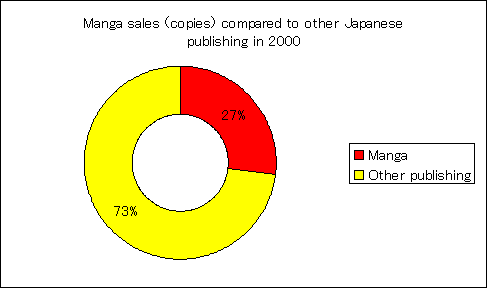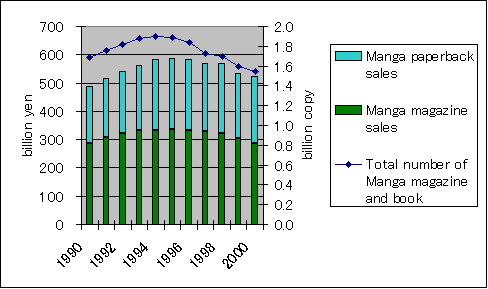News
Japanese Publishers to Produce "rental" Graphic Novels
posted on by Christopher Macdonald
Move to combat the resale market and protect profits
SOurce: Japan Economic Newswire
Kodansha, Shogakugan and several other Japanese publishing houses have announced that, starting in 2004, they will publish Manga paperbacks for rental use. They aim to develop a new system that will enable major rental outlets to cooperate with publishers and copyright holders, readers to rent the product. They also aim to convince the Ministry of Economy and Industry and The Cultural Division to amend the copyright laws to give a certain amount of control over this rental industry to the copyright holders and publishers.
In recent years, the proliferation of second hand Manga bookstores, called Shin-kosho-ten, have cut into the sales of manga, and therefore the profits of publishers (see charts below). Manga publishers and Manga artists such as Leiji Matsumoto and Tetsuya Chiba have spoken out against the unregulated Shin-kosho-ten.
The publishers aim to have the law ammended in such ways that will give then authority over the manner in which their publications can be rented out, possibly making it illegal to rent out "non-rental" copies. They also aim to make it so that they can require a share of the profit from rentals (in the same way that broadcasters must pay a fee every time they air a song on the radio). Most paperbacks would be published in two formats, "rental" and "non-rental."
The rental-only Manga books will be available at Manga rental shops, Manga coffee shops, and CD and homevideo rental stores.
Publishers and Manga-ka have also been disturbed by businesses that out graphic novels as most of these shops have traditionally bought their manga from Shin-kosho-ten. This new change in tactics by the publishers is also seen as a way of getting the rental shops to buy the manga from the publishers (and their distributors).



Kodansha, Shogakugan and several other Japanese publishing houses have announced that, starting in 2004, they will publish Manga paperbacks for rental use. They aim to develop a new system that will enable major rental outlets to cooperate with publishers and copyright holders, readers to rent the product. They also aim to convince the Ministry of Economy and Industry and The Cultural Division to amend the copyright laws to give a certain amount of control over this rental industry to the copyright holders and publishers.
In recent years, the proliferation of second hand Manga bookstores, called Shin-kosho-ten, have cut into the sales of manga, and therefore the profits of publishers (see charts below). Manga publishers and Manga artists such as Leiji Matsumoto and Tetsuya Chiba have spoken out against the unregulated Shin-kosho-ten.
The publishers aim to have the law ammended in such ways that will give then authority over the manner in which their publications can be rented out, possibly making it illegal to rent out "non-rental" copies. They also aim to make it so that they can require a share of the profit from rentals (in the same way that broadcasters must pay a fee every time they air a song on the radio). Most paperbacks would be published in two formats, "rental" and "non-rental."
The rental-only Manga books will be available at Manga rental shops, Manga coffee shops, and CD and homevideo rental stores.
Publishers and Manga-ka have also been disturbed by businesses that out graphic novels as most of these shops have traditionally bought their manga from Shin-kosho-ten. This new change in tactics by the publishers is also seen as a way of getting the rental shops to buy the manga from the publishers (and their distributors).


